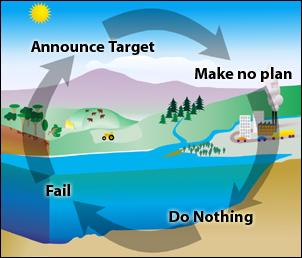estimates of biogenic methane emissions reductions needed in 2050 and 2100 to achieve and maintain a state of no additional warming from New Zealand’s biogenic methane emissions relative to 2017 levels of warming.[Emphasis added]
So, their "independent" review has been instructed from the outset to overturn the existing targets, and recommend ones which lock in 2017 levels of agricultural emissions. Those levels were already unsustainable (criminally so), but its also obviously going to have an impact on whether we achieve our Paris NDC of a 50% reduction in net greenhouse gas levels from 2005. Basically, locking in 2017 agricultural emissions and committing to doing nothing to reduce them increases our chances of missing that target, and increases the costs of doing so. Those are already estimated at up to $24 billion; National's criminal decision will push that even higher. But the review won't be considering this - in fact, they're specifically forbidden from considering the "implications of any new proposed target on the broader climate strategy". So they'll be required to produce dishonest, one-sided advice, which climate-change denying politicians will then use to cover their ecocidal decision not to act.
But its not just our Paris commitments we'll be reneging on. Article 19 of the NZ-EU FTA binds both parties to take urgent action to combat climate change, to implement the Paris Agreement and NDC commitments, and to
refrain from any action or omission that materially defeats the object and purpose of the Paris Agreement.Rewriting your targets to undermine your NDC and lock in agricultural emissions at 2017 levels seems to be exactly such an action. I wonder what the EU will think of it?
